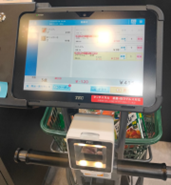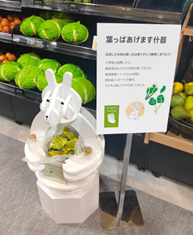The 58th Supermarket Trade Show 2024 (SMTS2024) was held in February 2024 in Tokyo, Japan. Organised by the National Supermarket Association of Japan (NSAJ), the exhibition is one of the leading events within the grocery sector in the country. In addition to presenting on the topic of customer loyalty during the event, Euromonitor International has identified five pivotal trends expected to shape the future of customer loyalty within the grocery retail space in Japan, driven by growing digitalisation.
Despite ranking as the world’s fourth largest economy, Japan has not kept pace with other nations in promoting digitalisation.
For promoting digitalisation, Japan held the 10th position among 50 countries in 2021 but is projected to slip to 14th by 2026
Source: Euromonitor International's Digital Consumer Index 2022
The future trajectory of Japan’s ranking hinges on the measures adopted by the government, manufacturers, and retailers. The event highlighted several initiatives utilising digital technologies in grocery retail. These concepts are expected to improve the overall in-store shopping experience while elevating customer satisfaction.
1: Retail media will change how retailers communicate with consumers
Digital signage and its use for promotions and retail media have shown momentum within the retail space in Japan. During the event, companies such as Okamura Corporation and VusionGroup introduced the most recent retail concepts. The high-resolution screen, which switches between images one after another, has the element of making the in-store experience more exciting, and is a tool for retailers to transmit information to consumers more efficiently and effectively. Daily special offers, loyalty points, rewards and campaigns can also be promoted extensively.

Image Source: Euromonitor International
2: Real-time promotion to boost personalised shopping experience
Toshiba Tec Corporation introduced a prototype of real-time promotion using shopping carts equipped with a tablet and scanner enabling personalised shopping offers. The tablet set on the shopping cart scans products as well as showing promotions such as coupons related to the product purchase to provide instant gratification. The tablet also provides other product recommendations based on the contents inside the cart.

Image Source: Euromonitor International
3: Elevating store value through commitment to sustainability
Various innovations on sustainability were observed, especially in terms of energy saving and sustainable packaging such as reduced usage of plastic. While such innovations are important to achieve sustainability goals for overall operation for retailers, it is also important to make such actions visible and easy for consumers to understand. Simple messaging such as recycling in-store and collecting vegetable scraps, such as discarded outer cabbage leaves, to feed small animals can still go a long way to help drive sustainable actions and reinforce emotional loyalty. Innovative sustainability initiatives must be incorporated as part of the reward structure of loyalty programmes to help educate and encourage sustainable actions among members.

Image Source: Euromonitor International
4: Remote communication to help enhance inclusiveness
Providing excellent customer service has long been considered the most important element of the retail industry in Japan. However, due to labour shortages caused by population decline and the recent increase in inbound tourists, it has become difficult to provide ideal customer-orientated services. Timeleap Inc's RURA connected tablet provides remote multilingual translation communication services (including sign language). Through the device, remote interpreters are always on standby, ready to receive calls from retailers and provide immediate customer service. Such tools will help optimise staff operations while maintaining the human touch, which is key for nurturing customer engagement and boosting loyalty.
5: External partners facilitate the digitisation of grocery retail
With the rapid acceleration of digitalisation in the country, grocery retailers cannot tackle this transition alone. Partnerships with external vendors can help speed up this process to provide unique experience to consumers. An interesting example is BIPROGY Inc’s Smart Campaign service, which enables its technology to integrate seamlessly with retailers’ custom-developed apps or loyalty programmes. By integrating this service, retailers can effortlessly analyse consumer purchase behaviour and execute diverse marketing campaigns.
In-store shopping still holds significant importance for Japanese consumers with 85% of total retail value in Japan generated offline in 2023
Source: Euromonitor International
As Japan faces population decline, consumer retention is critical for retailers to stand out from competitors and maintain presence in the market. For retailers, revolutionising in-store experience through various digital technologies will not only enhance the shopping experience and boost sales but also help cultivate loyalty among consumers.
Read our report, The Transformation of Customer Loyalty: A Pan-Industry View, for more analysis including loyalty in the retail space, or 2024年世界の消費者トレンドが日本市場にもたらす影響を考察する to learn more about Euromonitor International’s Global Consumer Trends 2024 in Japan.
